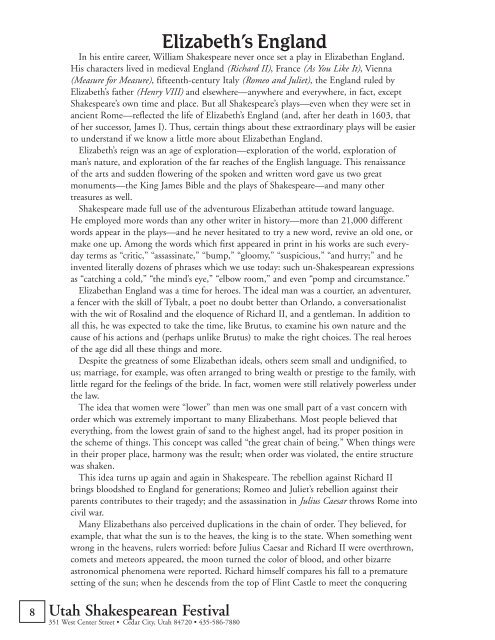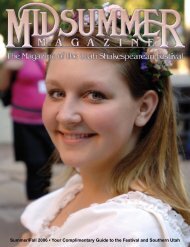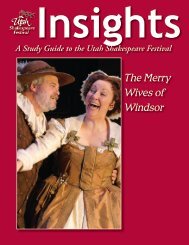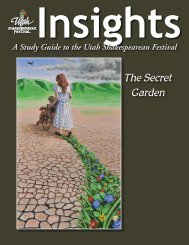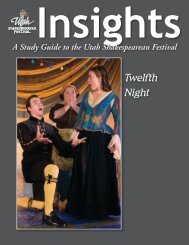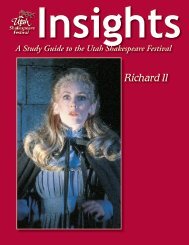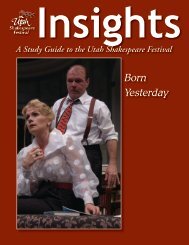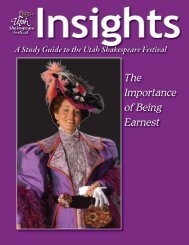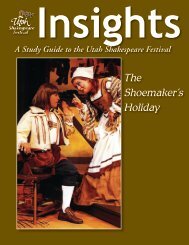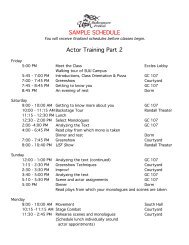Romeo and Juliet - Mr. Robertson's Bunker
Romeo and Juliet - Mr. Robertson's Bunker
Romeo and Juliet - Mr. Robertson's Bunker
Create successful ePaper yourself
Turn your PDF publications into a flip-book with our unique Google optimized e-Paper software.
Elizabeth’s Engl<strong>and</strong>In his entire career, William Shakespeare never once set a play in Elizabethan Engl<strong>and</strong>.His characters lived in medieval Engl<strong>and</strong> (Richard II), France (As You Like It), Vienna(Measure for Measure), fifteenth-century Italy (<strong>Romeo</strong> <strong>and</strong> <strong>Juliet</strong>), the Engl<strong>and</strong> ruled byElizabeth’s father (Henry VIII) <strong>and</strong> elsewhere—anywhere <strong>and</strong> everywhere, in fact, exceptShakespeare’s own time <strong>and</strong> place. But all Shakespeare’s plays—even when they were set inancient Rome—reflected the life of Elizabeth’s Engl<strong>and</strong> (<strong>and</strong>, after her death in 1603, thatof her successor, James I). Thus, certain things about these extraordinary plays will be easierto underst<strong>and</strong> if we know a little more about Elizabethan Engl<strong>and</strong>.Elizabeth’s reign was an age of exploration—exploration of the world, exploration ofman’s nature, <strong>and</strong> exploration of the far reaches of the English language. This renaissanceof the arts <strong>and</strong> sudden flowering of the spoken <strong>and</strong> written word gave us two greatmonuments—the King James Bible <strong>and</strong> the plays of Shakespeare—<strong>and</strong> many othertreasures as well.Shakespeare made full use of the adventurous Elizabethan attitude toward language.He employed more words than any other writer in history—more than 21,000 differentwords appear in the plays—<strong>and</strong> he never hesitated to try a new word, revive an old one, ormake one up. Among the words which first appeared in print in his works are such everydayterms as “critic,” “assassinate,” “bump,” “gloomy,” “suspicious,” “<strong>and</strong> hurry;” <strong>and</strong> heinvented literally dozens of phrases which we use today: such un-Shakespearean expressionsas “catching a cold,” “the mind’s eye,” “elbow room,” <strong>and</strong> even “pomp <strong>and</strong> circumstance.”Elizabethan Engl<strong>and</strong> was a time for heroes. The ideal man was a courtier, an adventurer,a fencer with the skill of Tybalt, a poet no doubt better than Orl<strong>and</strong>o, a conversationalistwith the wit of Rosalind <strong>and</strong> the eloquence of Richard II, <strong>and</strong> a gentleman. In addition toall this, he was expected to take the time, like Brutus, to examine his own nature <strong>and</strong> thecause of his actions <strong>and</strong> (perhaps unlike Brutus) to make the right choices. The real heroesof the age did all these things <strong>and</strong> more.Despite the greatness of some Elizabethan ideals, others seem small <strong>and</strong> undignified, tous; marriage, for example, was often arranged to bring wealth or prestige to the family, withlittle regard for the feelings of the bride. In fact, women were still relatively powerless underthe law.The idea that women were “lower” than men was one small part of a vast concern withorder which was extremely important to many Elizabethans. Most people believed thateverything, from the lowest grain of s<strong>and</strong> to the highest angel, had its proper position inthe scheme of things. This concept was called “the great chain of being.” When things werein their proper place, harmony was the result; when order was violated, the entire structurewas shaken.This idea turns up again <strong>and</strong> again in Shakespeare. The rebellion against Richard IIbrings bloodshed to Engl<strong>and</strong> for generations; <strong>Romeo</strong> <strong>and</strong> <strong>Juliet</strong>’s rebellion against theirparents contributes to their tragedy; <strong>and</strong> the assassination in Julius Caesar throws Rome intocivil war.Many Elizabethans also perceived duplications in the chain of order. They believed, forexample, that what the sun is to the heaves, the king is to the state. When something wentwrong in the heavens, rulers worried: before Julius Caesar <strong>and</strong> Richard II were overthrown,comets <strong>and</strong> meteors appeared, the moon turned the color of blood, <strong>and</strong> other bizarreastronomical phenomena were reported. Richard himself compares his fall to a prematuresetting of the sun; when he descends from the top of Flint Castle to meet the conquering8Utah Shakespearean Festival351 West Center Street • Cedar City, Utah 84720 • 435-586-7880


